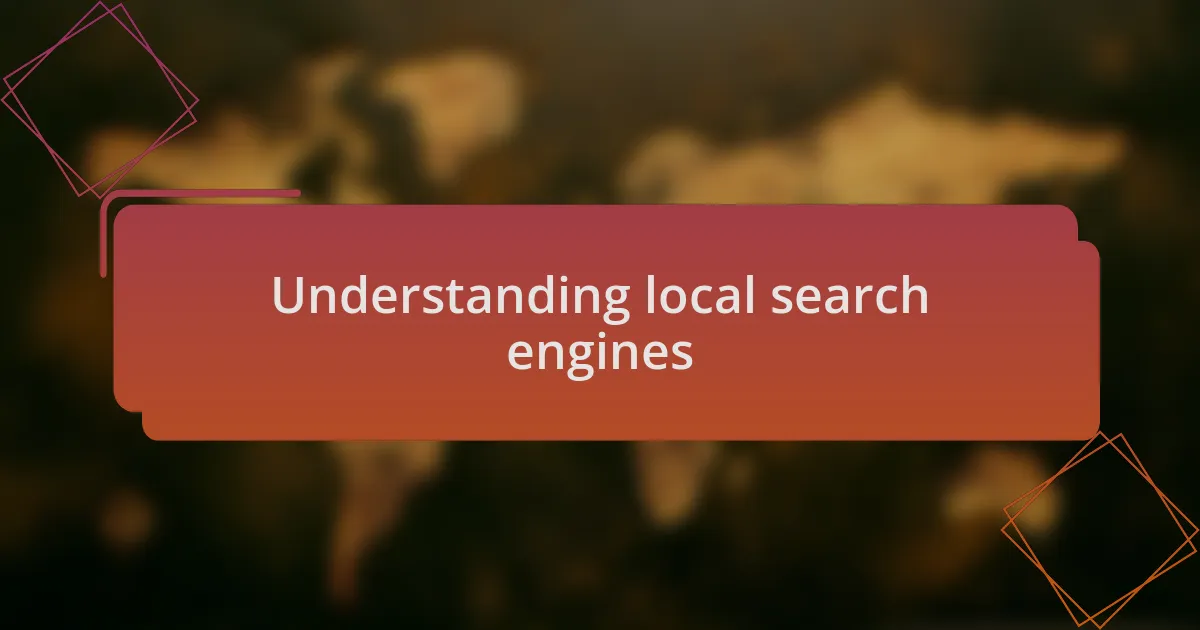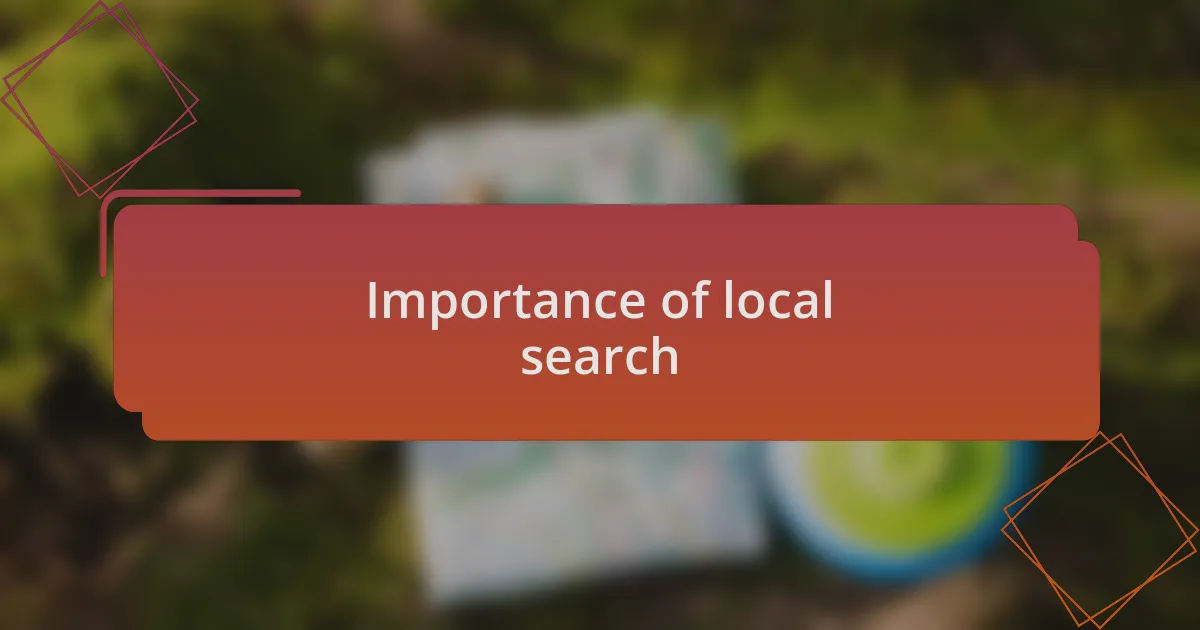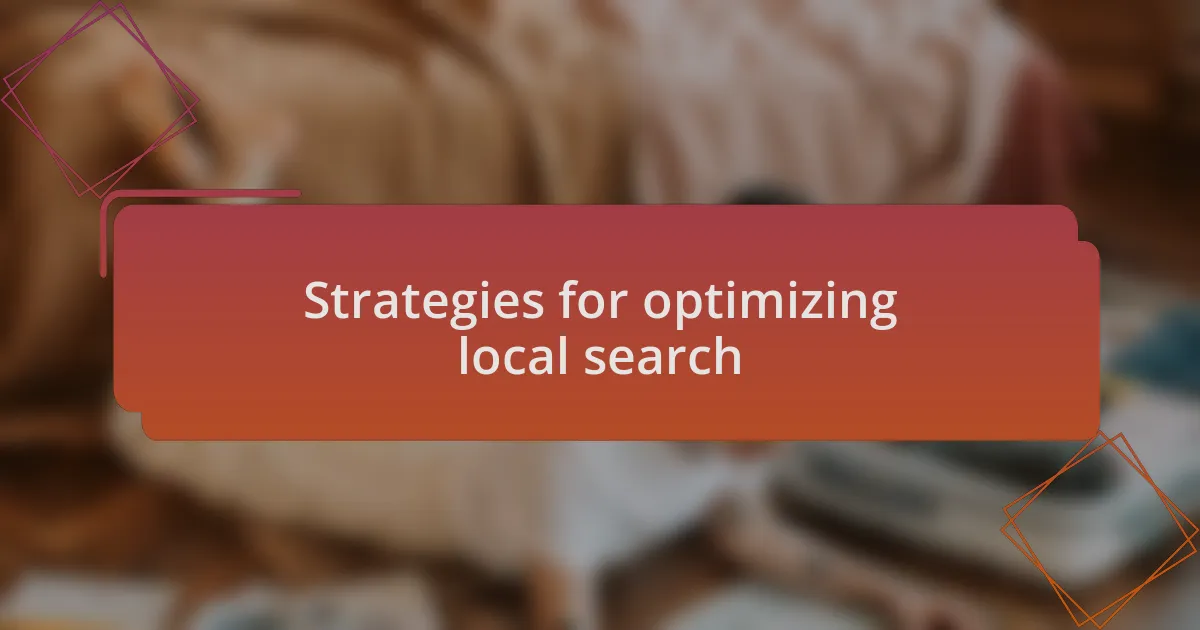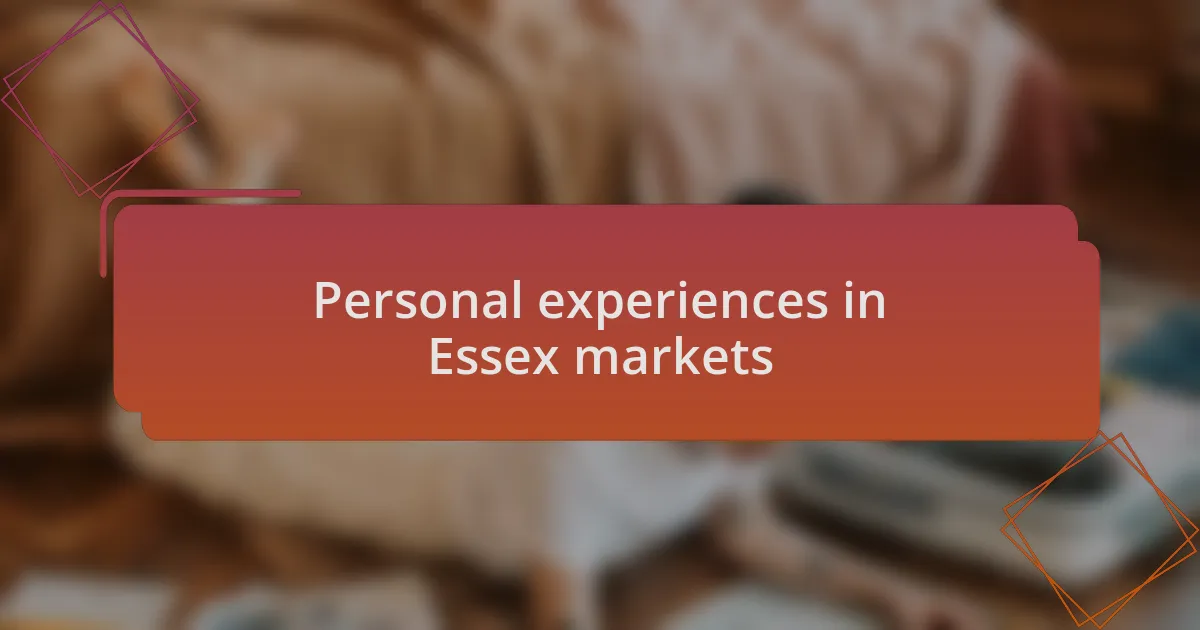Key takeaways:
- Local search engines prioritize geographical relevance, helping businesses connect with nearby customers and enhance visibility.
- Optimizing online presence through tools like Google My Business and maintaining consistent information (NAP) can significantly improve local search outcomes.
- Engagement and storytelling in marketing create stronger bonds with customers, turning casual shoppers into loyal advocates.
- Regular presence at local markets fosters community connections and builds trust, leading to increased customer loyalty.

Understanding local search engines
Local search engines are unique in that they prioritize results based on geographical relevance. Have you ever thought about how a simple search for “coffee shop” yields different results in Essex compared to London? This local focus helps businesses connect with community members, enhancing both visibility and trust.
When I first started exploring local search engines, I was surprised by how they tailored results to my immediate surroundings. I remember searching for a handyman and was directed to a service that was just a street away. That experience was eye-opening—it illustrated how local search engines help consumers find essential services quickly and conveniently.
These engines use various signals to determine rankings, including geographic location, user reviews, and local relevance of content. It makes me wonder, how can businesses optimize their online presence to ensure they show up when potential customers are searching nearby? Understanding these components can empower local businesses to thrive in an increasingly digital landscape.

Importance of local search
Engaging in local search has transformed how I discover businesses and services in my area. I still recall a Saturday morning when I searched for “best brunch spots near me.” The local search engine not only highlighted popular nearby restaurants but also included real-time reviews. This instant feedback made it easier for me to choose a place that suited my mood perfectly. Isn’t it fascinating how local searches can streamline our decisions?
Local search is vital for small businesses, and I’ve witnessed its impact firsthand with a local florist I know. After optimizing their online presence, they received a surge of inquiries from neighborhood customers looking for quick delivery options. The joy on the florist’s face when they realized that local search brought in business was palpable. It underscores how these search engines can drive foot traffic and foster community connections, which ultimately strengthens the local economy.
What I find particularly compelling is the way local searches create a sense of belonging. When I type in queries with the name of my town or even my street, I feel connected to my community. It’s not just about finding a product or a service; it’s about supporting local economies and discovering hidden gems around me. How often do we look past the larger chains when our neighbors offer something just as wonderful? Local search highlights these opportunities, making it essential for both consumers and businesses alike.
Overview of Essex’s markets
Essex’s markets are vibrant hubs of activity that showcase the region’s unique blend of culture and commerce. I remember strolling through Colchester’s market on a sunny Saturday, captivated by the colorful stalls brimming with fresh produce, handmade crafts, and local delicacies. Each vendor has a story, and I find it enriching to connect with these passionate individuals who pour their heart into what they sell.
The variety found in Essex’s markets is remarkable, reflecting the diverse community that calls this area home. From the bustling Southend-on-Sea market, where I’ve discovered amazing handmade jewelry, to the traditional farmers’ markets that emphasize local farming, there’s always something new to explore. It’s incredible how these markets not only provide goods but also foster relationships among locals, creating an inviting atmosphere that’s hard to resist.
Moreover, the sense of community in Essex’s markets extends beyond shopping. I’ve experienced firsthand how market events can turn into social gatherings; neighbors meet up, share laughs, and even trade recipes. Have you ever attended a market that felt more like a family reunion? That personal connection enriches the shopping experience, making you feel like you’re part of something bigger. Such interactions breathe life into Essex’s markets, proving that they are more than just places to buy and sell.

Strategies for optimizing local search
When it comes to optimizing local search, I often find that utilizing Google My Business (GMB) can be a game changer. I remember setting up my GMB profile for a small pop-up shop, and the results were immediate; local customers started finding me effortlessly. It’s astonishing how detailed information like operating hours, photos, and customer reviews can boost visibility in search results. Are you making the most of GMB for your local presence?
Consistent NAP (Name, Address, Phone Number) information is another vital strategy. I learned the hard way that discrepancies can confuse potential customers and hurt rankings. Once, I changed my shop’s address without updating it everywhere online, and I noticed a drop in foot traffic. Keeping your NAP consistent across all platforms is essential for building trust and ensuring that local searchers can find you without hassle.
Content creation that reflects local interests can also elevate your search optimization efforts significantly. I’ve seen great success by writing blog posts or creating events around local festivals and markets. This not only attracts attention but also fosters community engagement. Have you ever thought about how your unique insights into local events can draw attention to your business? Aligning your content with what matters to your community will resonate with both customers and search engines alike.
![]()
Tools for tracking local search
Tracking local search performance is crucial in understanding what strategies are truly effective. I remember using tools like Moz Local to monitor how my pop-up shop appeared across various directories. The insights I gained helped me pinpoint areas needing attention; it was like having a road map to navigating local SEO.
Another tool I found incredibly beneficial was BrightLocal, which allowed me to analyze my rankings against competitors. The data revealed surprising gaps and opportunities in my local market. Have you ever noticed how a slight edge in visibility can make all the difference? That’s what I experienced, and it motivated me to continually refine my approach.
Google Analytics also deserves a mention for its robust features tailored to local search tracking. By setting up specific goals linked to my shop’s local traffic, I was able to see exactly how well my marketing efforts were converting. This kind of tailored tracking brings clarity to what really works, making it easier to allocate time and resources effectively. How do you track your successes? Finding the right tools can transform your local search game entirely.

Personal experiences in Essex markets
I often found myself wandering through the vibrant stalls of the Essex markets, captivated by the array of fresh produce and local crafts. One Saturday morning stands out in my memory—I stumbled upon a small vendor selling homemade jams. The rich flavors transported me back to my grandmother’s kitchen, evoking a rush of nostalgia. It was a simple moment, yet it made me realize how personal connections and the story behind each product can create a deeper bond with customers.
Another experience that struck me was at a bustling farmers’ market where I had a chance conversation with a local farmer. He opened up about the challenges he faced with weather conditions impacting his harvests. Hearing his passion and dedication reminded me that behind every product lies a unique narrative, which is something I strive to convey in my own ventures. Have you ever listened to a seller speak passionately about their craft? It truly enriches the shopping experience and fosters loyalty.
I recall one particularly rainy day when foot traffic was lighter than usual. Instead of feeling discouraged, I decided to engage more personally with those who did stop by. I shared stories about my own business journey and offered samples of my products. That day taught me the importance of adaptability and authenticity. Connecting with customers on a personal level not only brightened their day but also left a lasting impression that paid off in future sales.

Key takeaways from my success
I learned early on that storytelling is a powerful tool in marketing. When I showcased the origins of my products—such as the meticulous crafting process of my handmade soaps—customers became genuinely interested. Remember that time you shared a piece of your story and saw the way it resonated with someone? It’s moments like those that forge connections and encourage loyalty.
Another key takeaway for me was the significance of community engagement. One time, I organized a small workshop at the market, allowing customers to see how their favorite items were made. The excitement in their eyes as they participated was incredibly rewarding. Have you ever considered how a little involvement can transform a customer into a passionate advocate for your brand? Those face-to-face interactions built trust and turned casual shoppers into regulars.
Lastly, I discovered that consistency is vital. I made it a point to show up regularly at the same market, which created familiarity. Over time, I began to recognize returning customers, and they recognized me too. Isn’t it amazing how a consistent presence can lay the groundwork for strong relationships? Each visit became an opportunity to connect, and that investment of time truly paid off in building a loyal customer base.